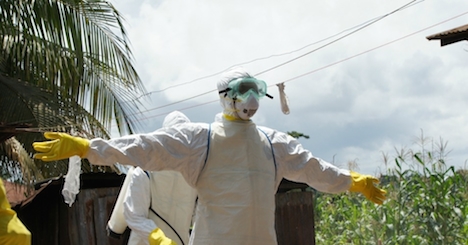|
By Staff Writers, CommonDreams
Blacklisted News
Friday, Sep 26, 2014
 |
| A health worker is sprayed down in the district of Kailahun, in eastern Sierra Leone, one of the Ebola epicenters. (Photo: European Commission DG ECHO/flickr/cc) |
As world leaders gathered in New York this week to discuss the Ebola epidemic, Sierra Leone put more than a million of its citizens under an indefinite quarantine "with immediate effect" on Thursday, in a desperate effort to curb the crisis.
President Ernest Bai Koroma announced Wednesday that the northern districts of Port Loko and Bombali, as well as the southern area of Moyamba, would be closed down, cutting off roughly 1.2 million people from leaving the region. The move comes as residents in Kenema and Kailahu, the country's eastern districts, continue grappling with their own curfews, leaving almost a third of the country's population of six million under strict quarantine.
The deadliest Ebola epidemic in history has infected more than 6,000 people in West Africa and killed nearly half of them, according to the World Health Organisation (WHO). Guinea has managed to wrangle control over its outbreak, but the situation has worsened in Sierra Leone, where 1,940 are infected and almost 600 dead, WHO said on Thursday.
"The situation in Guinea, although still of grave concern, appears to have stabilised: between 75 and 100 new confirmed cases have been reported in each of the past five weeks," WHO said in a statement.
But WHO's statistics for the outbreak in Sierra Leone come from the country's Ministry of Health, which international health officials say are inaccurate. The real death toll may be much higher, the Western diplomat in Sierra Leone told the New York Times.
"The W.H.O. added a veiled caveat to the statistics in its latest report as in the preceding one, saying that they were 'subject to change' because of 'ongoing reclassification,'" the Times writes. "Indeed cemetery workers here in the capital report that Ebola deaths far exceed what the government has so far acknowledged."
Forced quarantines and lockdowns of sick communities have been criticized by health organizations like Doctors Without Borders/Médecins Sans Frontières (MSF), who said earlier this month that those measures "end up driving people underground and jeopardizing the trust between people and health providers."
MSF issued that statement in response to a planned, three-day nationwide lockdown that took place last week; at the time, presidential adviser Ibrahim Ben Kargbo told Reuters that the "aggressive approach is necessary to deal with the spread of Ebola once and for all."
On Wednesday, after announcing his plan to impose the new, indefinite quarantine, President Koroma told reporters that "The isolation of districts and chiefdoms will definitely pose great difficulty, but the lives of everyone and the survival of our country takes precedence over these difficulties."
WHO has warned that the number of cases in the area could soar in the coming months without an immediate response by world leaders. At the UN meeting on Thursday, President Barack Obama likewise stressed the urgency of a coordinated international effort to address the crisis.
"If unchecked, this epidemic could kill hundreds of thousands of people in the coming months," Obama said. "Ebola is a horrific disease... If ever there were a public health emergency deserving a strong and coordinated international response, this is it."
Obama's call to action comes as the Centers for Disease Control and Prevention (CDC) released new estimates that Ebola may infect 1.4 million people in Liberia and Sierra Leone by the end of January.
"This disease could cause a humanitarian catastrophe across the region," Obama said. "Stopping Ebola is in the interest of all of us."
The President's contribution to fighting the disease was military-based, as he announced last week that the U.S. would send 3,000 troops to West Africa to "support" doctors and scientists in containing and finding new treatments for the outbreak. It remains unclear what the role of the military will be in the public health crisis. As Foreign Policy in Focus writes:
[T]he White House plan comes in the context of a broader U.S.-led militarization of the region...
Perhaps more importantly, experts have warned that the provision of humanitarian assistance by uniformed soldiers could have dangerous, destabilizing effects, especially in countries with long histories of civil conflict, such as Liberia and Sierra Leone.
The use of the U.S. military in this operation should raise red flags for the American public as well. After all, if the military truly is the governmental institution best equipped to handle this outbreak, it speaks worlds about the neglect of civilian programs at home as well as abroad.
On Thursday, Joanne Liu, president of MSF, planned to appear at the UN conference to tell delegates that "the promised surge has not yet delivered," according to her prepared remarks, the Washington Post reports.
"Pledges of aid and unprecedented U.N. resolutions are very welcome. But they will mean little, unless they are translated into immediate action," Liu planned to say. "Fear and panic have set in, as infection rates double every three weeks. Mounting numbers are dying of other diseases, like malaria, because health systems have collapsed...Today, Ebola is winning."
Source URL
|
 Print This Print This

|

